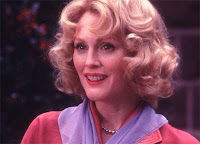Werth: Hello, Wise. You look exhausted. And what's with all the bags?
Wise: It was Fashion Week here in New York last week, and I've been inspired to live with a greater sense of style. So, I've been out shopping, trying to discover my very own je ne se quoi.
Werth: And what have you found?
Wise: That fashion is probably best left to the professionals and the teenage gazelles that inspire them. Still, it's nice to look good, and when I can't afford the latest from Lanvin, I like to return to one of the style icons of the Silver Screen: William Powell in The Thin Man.
Werth: You've sung the stylish praises of Nick and Nora Charles once before.
Wise: Which is part of the pleasure of MGM's greatest detective duo: there's always another sequel to enjoy. After the Thin Man (1936) begins a few days after the events of the first film as Nick (Powell) and Nora (the ever delightful Myrna Loy) alight from the train in their hometown of San Francisco, anxious to begin celebrating New Year's Eve.
Werth: Maybe she should try jumping off a bridge and being saved by an angel.
Wise: Escaping Selma's tears (and Aunt Katherine's stultifying guests) Nick and Nora head to a nightclub where they find Selma's ne'er do well husband Robert (Alan Marshall) making time with a two-bit nightclub singer (Dorothy McNulty who later took the name Penny Singleton and provided the voice for Jane Jetson). Robert recently convinced David to pay him off for leaving Selma, and when he turns up with a bullet in his back, Selma is the number one suspect, and Nick and Nora begin to investigate.
Their search turns up an assortment of petty thieves, gangster lowlifes, stereotyped evil Asians, and a load of slapstick provided by Powell's tippling and their loyal dog Asta's not-so-loyal doggie wife.
Werth: That bitch.
Wise: As in the first film, the clues don't exactly lead up to the final revelation, but who really cares when the detectives are as charming as these?
Werth: The fashion statement of Todd Haynes' Velvet Goldmine (1998) would be a tad more overstated than Mr. Powell's. Set in the wild era of 70's glam-rock and after, Goldmine follows reporter Arthur Stuart (Christian Bale) as he tries to find out whatever happened to his rock idol, Brian Slade (Jonathan Rhys Meyers) ten years after his 1974 feathery, faked assassination. The film becomes a glittery trip down memory lane as Stuart interviews an old manager (Michael Feast) and Slade's sycophantic ex-wife Mandy (Toni Collette) about the time they spent with the ego-maniacal performer.
Wise: So, sort of a disco-era Citizen Kane, only this time Rosebud's a Moog synthesizer.
Werth: The timeline gets all jumbled as flashbacks collide and Stuart's own personal memories become intertwined with the saga of Brian Slade. The film's exploration of "otherness" and adoration is a mass of intense visual design, erotica, and fashion.
Sandy Powell's Oscar-nominated costumes bring the age back to vivid life with platform shoes and boots, boas, neckscarves, tight jeans, velvet jackets, and glitter adorning nearly every character, with the exception of when Ewan McGregor bares it all (and I mean all) on stage as the savage Curt Wild.
Wise: That's one rock show I'd pay to see.
Werth: Slade's show costumes are inspired constructions reminiscent of the creations from David Bowie's Ziggy Stardust period. Bowie himself pulled his support of the film when he realized Haynes was basing it on unauthorized bios of Bowie, but the resemblances to infamous performers like Iggy Pop, Lou Reed and even Kurt Cobain are unmistakeable.
Goldmine feels like an extended music video at times, but then, looking back, perhaps that's the best way to depict that era. Haynes' focus on fashion goes beyond simple replication and celebrates the sense of identity, sexuality, and freedom that clothing can bring. So even if I wouldn't be caught dead in sequin-studded tights with thigh-high purple platform boots and a Louis XIV velvet jacket—
Wise: You wouldn't?
Werth: Maybe for next week's Film Gab.









.jpg)




















